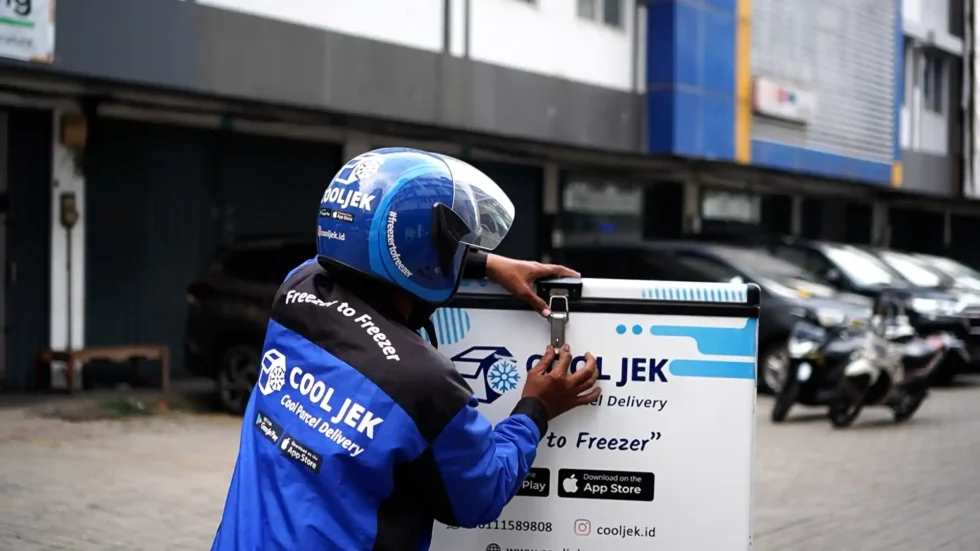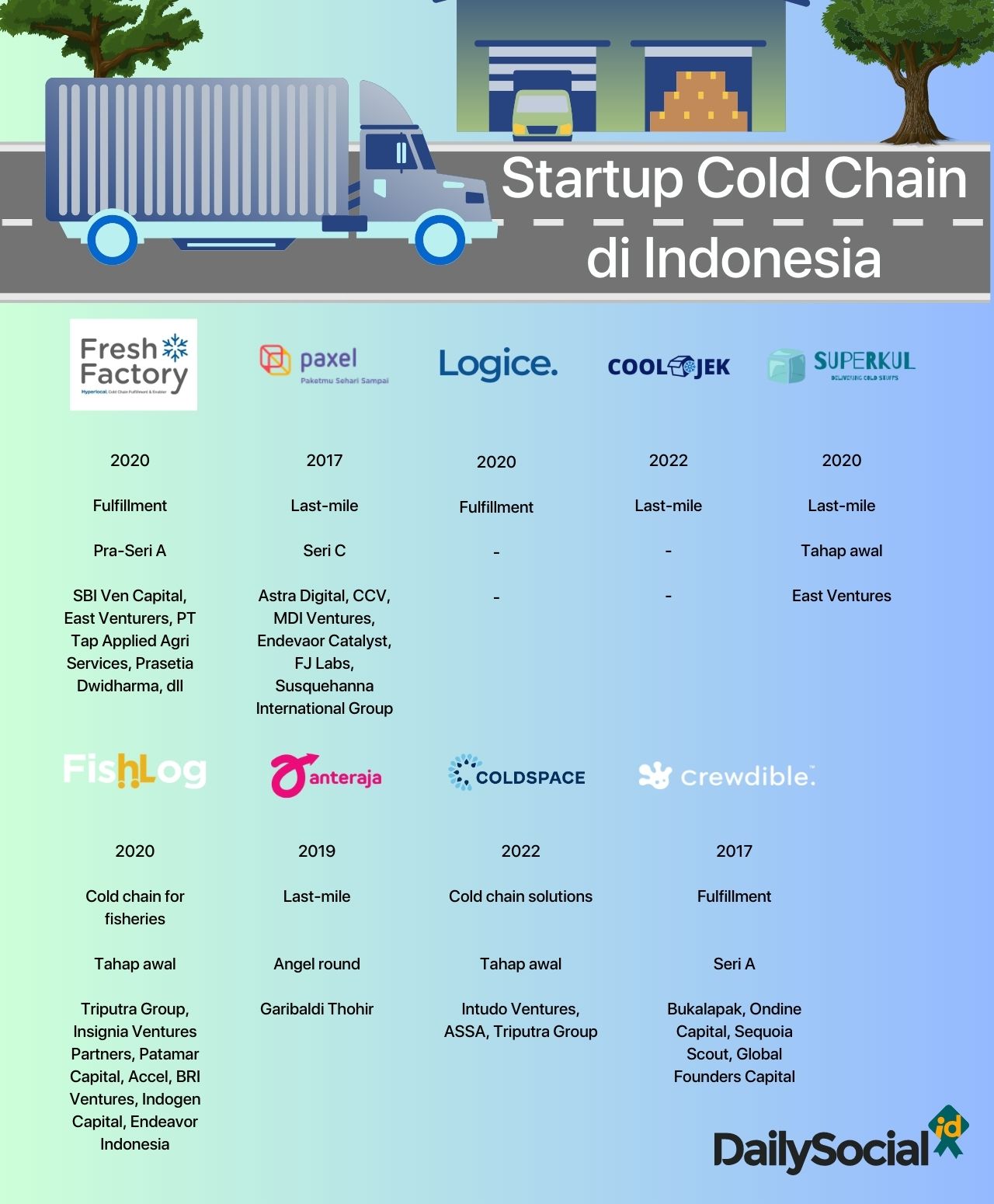Cold Chain Logistics Platforms Rise Up
Discussed with Fresh Factory, Paxel, Cool Jek, and Logice regarding cold chain business opportunities and opportunities towards sustainable business
The improvement in the Indonesian economy, marked by an increase in per capita income (Gross National Income/GNI) above $4.000 in 2022, has become a positive catalyst for the cold chain-based logistics industry, including the startup players in it.
One of the effects of this increase is the increasing public awareness to consume nutrient- and protein-laden foods, such as fresh milk, frozen meat, and ready-to-eat food.ready to eat, ready to heat, ready to cook). Unfortunately, the increase in demand has not been accompanied by the readiness of the industry, which is still fragmented and its business processes have not been digitized.
Cold chain logistics as a whole is in line with the potential that the agriculture and aquaculture industry has to offer, as both require refrigeration at some point in their supply chain.
Menurut report Allied Market Research, in 2021 the cold chain market value in Indonesia will almost reach $5 billion and is expected to grow at a CAGR of 10,2% in the next 10 years.
To DailySocial.id, Fresh Factory CMO Widijastoro Nugroho even detailed the market share of this industry based on the results of his research.
- In Indonesia, demand for cold storage reaches 400.000 pallets a year, while the ready supply is only 200.000 pallets.
- In 2018, the cold chain sector contributed 15% of Indonesia's GDP.
- In 2018, fishing industry production reached 25 million tons.
- In 2018, meat and poultry production reached 40 million tons.
- In 2018, industrial consumption process food reached 7 million tons, with a market growth opportunity of $13,8 billion.
- There are 5,8 million registered cold chain sellers in Indonesia and the number continues to grow.
"The increase in GDP is partly due to the husband and wife in young families, both working. Because the wife works, then convenient be an important factor in the development of new products. frozen food who can give convenient will grow quickly. This product will require cold chain fulfillment center, especially if it's for sale direct-to-consumer through E-commerce," explained Widi.
Cold chains are not only needed to store food and drinks. The pharmaceutical industry also relies heavily on this industry, including when distributing vaccines, insulin and reagents to remote areas. All of the above product categories are mentioned perishable goods (non-durable product).
Lots of challenges
Behind it all, the issues in this industry are much more complex compared to logistics supply chain systems in general because of the high preparation and operational costs. Therefore, this is not a realm that many startups enter.
The conventional players currently dominating in Indonesia are Diamond Cold Storage, Wahana Cold Storage, and Maersk Line.
"cold chain much more complex than that non-cold/frozen because it requires good temperature integrity to be maintained first mile to last mile. "If the temperature is not maintained, the quality of products, such as food and pharmaceuticals, will be reduced or even damaged," said the CEO of Paxel Zaldy Ilham Masita.
Co-founder Cool Jack Nathanael Christopher said that inadequate infrastructure is causing the percentage food loss which is quite high at 13 million tons of food waste every year. Because, products that should be handled specifically by the cold chain are instead handled by conventional delivery, for example for delivery to final consumers.
The lack of standardization in terms of storage, shipping and packaging procedures is a very important issue. Because there is no reference, consumers end up using conventional delivery which does not implement a cold supply chain for delivery and ultimately causes product damage and changes in product quality.
"With the habit of sending using online motorcycle taxis or conventional couriers, customers are reluctant to pay more for a special delivery service that applies cold chains which is more expensive. "As a result, consumers often receive them in damaged condition," said Nathanael.
Cool Jek is a fleet last mile for frozen products, use a refrigerated motor (refrigerated motor freezer box), which targets the B2B and B2C segments as its target users. This startup has only been operating since 2022.
Widi added, to maintain a temperature of -18 degrees Celsius end-to-end is the main challenge in cold chain distribution. Everything must be tracked with IoT, checking the temperature state of the logistics chain frozen and chilled products. Plus, the shelf life of frozen goods is relatively short because they spoil quickly.
As a result, a FeFo WMS system is needed (First Expired First Out) to record the expiration time and the system will arrange outbound automatically. "So that the goods with expiration date "You'll come out earlier," he said.
"There are still high investment costs to build Indonesia's cold chain network because almost all materials have to be imported. The government has not provided much assistance to business actors in the field of cold chains this," added Nathanael.
Complements existing businesses
Even though they are new players, both Paxel, FreshFactory, Cool Jek, and Logice believe that one of the biggest obstacles for companies wanting to enter the cold chain business is the need for different, complex infrastructure. Therefore, each offers solutions that are segmented to its target users.
logic and Fresh Factory both offer procurement solutions for the cold chain. Cool Jek enters the area last mile for delivery to consumers. Meanwhile, Paxel's solution is more comprehensive, starting from first mile, middle mile, to last mile.
"In general, startups provide what conventional players don't provide, so cold chain industry it will be better in the future," said Logice CEO Dwi Andika Irawan.
Widi added, to complement what already exists in the field, his party is taking various new approaches. Regarding pallets, for example, conventional players usually only do it store in pallets, then outbound can only in pallets and cardboard. Therefore, Fresh Factory takes the approach of making it possible to store on pallets, cardboard, or pieces.
"To serve consumers who need services fulfillment for direct-to-consumer, they need pick and packin pieces. That's the main service that Fresh Factory offers."
Plus, conventional players usually have large warehouses located outside the city. As a result, the distance to the consumer's house takes longer. Fresh Factory took a different approach, building a network of warehouses as fulfillment center small in size, with large quantities, and spread throughout the city (hyperlocal).
"For example, in Jakarta we have 13 hubs. Fresh Factory is present in every municipality and district, so the distance between consumers' homes can be within a radius of 8 km. Comparison, rates Gojek and Grab flat IDR 20 thousand within an 8 km radius."
To support integration between warehouses, the company provides a WMS system that guarantees FeFo (First Expired First Out) and FiFo (First in first out) in accordance with the needs of frozen and chilled goods which have a relatively shorter shelf life. For example, fresh milk has a shelf life of only 30-40 days.
"We provide access to our WMS so that FF [Fresh Factory] consumers cantrack stock in a manner live, men-track all activities pick and pack with time stamp since the order enters from the marketplace into the FF system."
Fresh Factory itself has the ambition to become a cold chain player with the widest warehouse network in Indonesia. Therefore, the company announced a partnership with PT Nusantara Card Semesta (NCS) in July 2023.
After the MoU, Fresh Factory will activate all of its warehouses spread across 111 locations cold chain fulfillment center (product storage, packaging and delivery points), as well as more than 2.000 couriers to deliver services in 103 cities in Indonesia. These warehouses are located throughout Indonesia, starting from Makassar, seven cities in Sumatra, to Kalimantan.
It doesn't stop there, Fresh Factory will continue to expand warehouse management cooperation with Bulog and PLN.
Meanwhile, Paxel expanded its business to cold chain from previously being a logistics player last mile. The company uses cold chain facilities for mid-mile, utilizing refrigerated trucks. Meanwhile, for corporate customers, motorbikes/refrigerated cars are prepared for delivery first mile to last mile.
"Apart from that, we also provide coldstorage in all hub Paxel in Java and Sumatra for fulfillment and storage. Our next plan is to add more coverage area wider areas, such as Sulawesi and Kalimantan. Also, enter larger package sizes up to 1 ton for shipping door to door cold chain."
According to Zaldy, the Covid-19 pandemic has formed a new habit among people to send food between cities, not just within the city. The company also captures the potential of the culinary business in areas that have been hampered because there is no cold chain delivery that can accommodate it.
More Coverage:
Shown is the shipping volume of the segment frozen food processed by the company in 2021 rose 56% compared to 2020. Then in the first semester of 2022, the volume grew by 83% year-on-year. This performance is supported in part by a partnership with Wall's Indonesia for instant ice cream delivery in the Jabodetabek, Bandung, Surabaya and Palembang areas.
economic unit clear
There is a clear demand and a supply that has not been able to accommodate it, making this cold chain business a problem economic units which is clear to become a sustainable business. In fact, according to Andika, customer loyalty in this sector is so high, it can be seen from the fact that incumbent companies that already have a large market share can still operate today.
"Basically economic units for cold chains itself is very high due to the large demand that has not yet been accommodated by the industry and the low acquisition costs in customer acquisition. We believe Logice can be a sustainable business."
He explained, since operating in 2020, Logice has now collaborated with 27 vehicle owners and five warehouse owners spread across six cities, namely Jakarta, Semarang, Surabaya, Pontianak and Pekanbaru. The company fully targets the B2B and B2C segments, with a user base of more than 300 B2B clients and 1.200 B2C clients.

Nathanael also showed the same optimism. This cold chain business is very visible because industrial players need to store fresh and frozen products which require refrigeration, and for delivery they need to use refrigerated cars or motorbikes.
"We are very optimistic that this service will develop quickly because we are taking a market gap that has not been served much and Cool Jek is more economical for urban areas that are very congested and congested."
It is said that currently Cool Jek already serves 300 points per month by relying on just one hub just. Nathanael will increase its capacity, starting from a fleet of motorbikes and cars, opening a procurement service with a small cold warehouse, providing refrigerated locker rentals, and using electric vehicles.
Sign up for our
newsletter
 Premium
Premium

